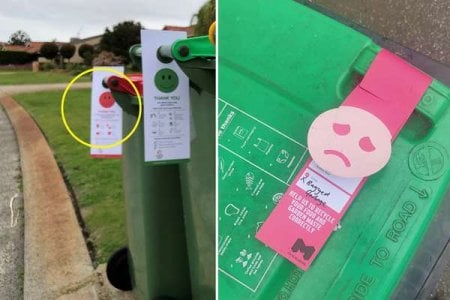Your bins could be rated next! New bin rules trigger mixed reactions
By
Maan
- Replies 21
Waste management might not be the most thrilling topic, but when councils start inspecting household bins and handing out feedback, it’s bound to spark debate.
A new initiative has left some residents frustrated over what they see as unnecessary oversight, while others welcome the effort to improve recycling habits.
So, what’s behind this program? Why is it stirring up such strong reactions? Let’s find out.
Residents in Perth had mixed reactions after the City of Joondalup council introduced a bin inspection program aimed at tackling incorrect waste disposal.
Council officers planned to conduct brief visual checks on bins during kerbside collection days, tagging them with either a happy or sad face depending on how well waste had been sorted.
A happy face indicated correct disposal, while a sad face came with feedback on what needed improvement.
A spokesperson for the City of Joondalup shared: ‘Over 2,000 properties have been randomly selected to participate in the program,’ which was set to run for six weeks.
The inspections alternated weekly, covering general waste and recycling one week, then general waste and garden organics the next, aligning with household collection schedules.
Each property’s bins were to be inspected three times, with repeated contamination resulting in stricter action.
For households that failed to correct issues after previous warnings, a final inspection could lead to a notice stating: ‘We were not able to collect your bin today.’
In such cases, the bin would be taped shut, moved away from the kerb, and left unemptied until the contamination was resolved.
A follow-up inspection on the next collection day would determine whether the household had corrected the issue.
This system had already been implemented in other parts of Australia, including New South Wales, Victoria, Queensland, and South Australia.
WA councils had standardised bin tags to ensure consistency across the state.
On social media, many residents opposed the initiative, with one person writing: ‘Erm how about no—snooping through people’s bin and then giving a condescending sticker if they’ve been a good girl or boy?’
Another frustrated resident said: ‘We pay enough rates. We don't need the bloody council checking our bins. We need them keeping the verge and parks and streets clean and perhaps the rangers keeping our suburbs safe.’
Others supported the move, arguing it was necessary to improve recycling habits.
‘Great idea—so many yellow bins just filled with everything that did not fit into the red one. So disappointing that the recycling gets contaminated by people just not caring,’ one woman commented.
One resident agreed that the idea was ‘decent’ but raised concerns about shared responsibility, stating: ‘Neighbours will often add their items to another bin… except if I’m going to be held responsible.’
Advocates for bin tagging said the program tackled a significant challenge in Australia’s waste management—contaminated recycling.
Incorrectly placed waste, such as soft plastics or food scraps in recycling bins, could render entire batches unsuitable for processing.
By providing direct feedback, councils aimed to educate residents, improve recycling rates, and reduce landfill waste.
Waste contamination also contributed to greenhouse gas emissions, with decomposing organic matter in landfills releasing methane, a potent contributor to climate change.
Sorting waste correctly helped reduce emissions and preserved natural resources by ensuring recyclables were properly processed instead of discarded.
Advocates also pointed to financial benefits, as councils faced high costs when contaminated recycling loads had to be redirected to landfill.
With better waste management, councils could cut processing costs and allocate more funds to environmental or community programs.
In a previous story, residents voiced their frustration over a shocking ‘maggot invasion’ linked to waste issues in their neighbourhoods.
With councils now cracking down on bin contamination, concerns about waste management are only growing.
Could these new inspections be the solution, or are they making things worse? Read more to find out.

With bin inspections now sparking debate across Australia, do you think this system is a step towards better waste management or just unnecessary oversight?
Share your thoughts in the comments!
A new initiative has left some residents frustrated over what they see as unnecessary oversight, while others welcome the effort to improve recycling habits.
So, what’s behind this program? Why is it stirring up such strong reactions? Let’s find out.
Residents in Perth had mixed reactions after the City of Joondalup council introduced a bin inspection program aimed at tackling incorrect waste disposal.
Council officers planned to conduct brief visual checks on bins during kerbside collection days, tagging them with either a happy or sad face depending on how well waste had been sorted.
A happy face indicated correct disposal, while a sad face came with feedback on what needed improvement.
A spokesperson for the City of Joondalup shared: ‘Over 2,000 properties have been randomly selected to participate in the program,’ which was set to run for six weeks.
The inspections alternated weekly, covering general waste and recycling one week, then general waste and garden organics the next, aligning with household collection schedules.
Each property’s bins were to be inspected three times, with repeated contamination resulting in stricter action.
For households that failed to correct issues after previous warnings, a final inspection could lead to a notice stating: ‘We were not able to collect your bin today.’
In such cases, the bin would be taped shut, moved away from the kerb, and left unemptied until the contamination was resolved.
A follow-up inspection on the next collection day would determine whether the household had corrected the issue.
This system had already been implemented in other parts of Australia, including New South Wales, Victoria, Queensland, and South Australia.
WA councils had standardised bin tags to ensure consistency across the state.
On social media, many residents opposed the initiative, with one person writing: ‘Erm how about no—snooping through people’s bin and then giving a condescending sticker if they’ve been a good girl or boy?’
Another frustrated resident said: ‘We pay enough rates. We don't need the bloody council checking our bins. We need them keeping the verge and parks and streets clean and perhaps the rangers keeping our suburbs safe.’
Others supported the move, arguing it was necessary to improve recycling habits.
‘Great idea—so many yellow bins just filled with everything that did not fit into the red one. So disappointing that the recycling gets contaminated by people just not caring,’ one woman commented.
One resident agreed that the idea was ‘decent’ but raised concerns about shared responsibility, stating: ‘Neighbours will often add their items to another bin… except if I’m going to be held responsible.’
Advocates for bin tagging said the program tackled a significant challenge in Australia’s waste management—contaminated recycling.
Incorrectly placed waste, such as soft plastics or food scraps in recycling bins, could render entire batches unsuitable for processing.
By providing direct feedback, councils aimed to educate residents, improve recycling rates, and reduce landfill waste.
Waste contamination also contributed to greenhouse gas emissions, with decomposing organic matter in landfills releasing methane, a potent contributor to climate change.
Sorting waste correctly helped reduce emissions and preserved natural resources by ensuring recyclables were properly processed instead of discarded.
Advocates also pointed to financial benefits, as councils faced high costs when contaminated recycling loads had to be redirected to landfill.
With better waste management, councils could cut processing costs and allocate more funds to environmental or community programs.
In a previous story, residents voiced their frustration over a shocking ‘maggot invasion’ linked to waste issues in their neighbourhoods.
With councils now cracking down on bin contamination, concerns about waste management are only growing.
Could these new inspections be the solution, or are they making things worse? Read more to find out.
Key Takeaways
- A Perth council’s bin inspection program tagged bins with happy or sad faces, with repeated contamination leading to collection refusal.
- The initiative, used across Australia, sparked debate—some saw it as unnecessary oversight, while others supported its environmental benefits.
- Advocates said it reduced recycling contamination, landfill waste, and greenhouse gas emissions.
- Better waste sorting could cut council costs and free up funds for community programs.
With bin inspections now sparking debate across Australia, do you think this system is a step towards better waste management or just unnecessary oversight?
Share your thoughts in the comments!








